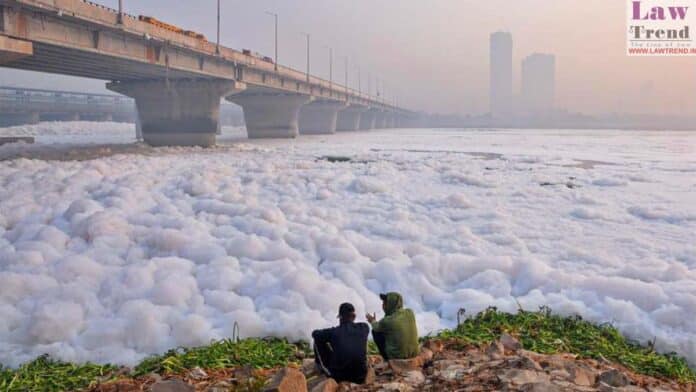The National Green Tribunal has said the “huge gap” in the generation and treatment of sewage in the Yamuna catchment area in Haryana needed to be remedied on a war footing.
It also noted that the water quality of the Yamuna river deteriorated after it entered the national capital and that the existing gaps in sewage management here needed to be “duly considered and addressed”.
Noting that the state of Uttar Pradesh did not submit a report regarding the Yamuna pollution, the tribunal said it was a matter of “serious regret”.

The tribunal was hearing matters pertaining to remedial action against “unabated pollution” of the Yamuna and the authorities’ alleged “failure” to tackle the same “to the detriment of the rule of law, environment and public health in spite of specific orders on the subject passed by the Supreme Court and the tribunal.”
A bench led by NGT Chairperson Justice A K Goel noted the report submitted by the state of Haryana stated that there was a gap of 240 million litres per day (MLD) between the generation and treatment of sewage.
“We are of the view that the huge gap in generation and treatment of sewage…needs to be remedied on war footing instead of the proposed plan of achieving the targets in the year 2027 after four years, thereby continuing damage to the environment for the next four years,” the bench also comprising Judicial Members Justice Sudhir Agarwal and Justice Arun Kumar Tyagi and Expert Members A Senthil Vel and Afroz Ahmad said.
It directed the chief secretary of Haryana to monitor the issue and file a progress report by April 30.
“We note that no report has been filed by the state of UP which is a matter of serious regret. The chief secretary may ensure the filing of such a report… Further progress report…be filed by April 30,” the bench said.
It further said the issue of levying environmental compensation on the state governments of Uttar Pradesh and Haryana will be dealt with separately.
Noting that the report submitted by the Delhi government, the bench said there was a gap of 238 million gallons per day (MGD) in sewage treatment and the gap needed to be “duly considered and addressed.”
It said the Central Pollution Control Board (CPCB) was directed by the tribunal to monitor water quality at inter-state borders and compile results, including data about the quality of effluent drained into the river Yamuna.
The report said that dissolved oxygen (DO) at the point of entry of the river Yamuna in Delhi met the criteria but biochemical oxygen demand (BOD) water quality was not being met and the concentration of BOD and faecal coliform increased after the river entered the national capital, the bench noted.
According to the report, the water quality of Yamuna met the prescribed criteria when the river entered Delhi at Palla from Haryana but the water quality deteriorated as it exited the national capital at Asgarpur, the bench noted.
This indicated that pollution in river Yamuna in Delhi was due to the discharge of untreated or partially treated domestic and industrial wastewater through 24 drains, the bench noted.
The bench also noted the compliance status of sewage treatment plants (STPs), according to which, out of 35 STPs, 23 were consistently non-compliant with the norms prescribed by the Delhi Pollution Control Committee (DPCC).
“CPCB is directed to monitor the performance of STPs in Delhi, Haryana and UP including the drains joining river Yamuna on a quarterly basis,” the bench said, adding “the first report…as on Match 31, 2023, be filed by April 30.” the bench said.
The tribunal also said the existing committee to deal with the issue of pollution in the Yamuna river could now deal with all related issues of Yamuna cleaning and sewage management, including the quality of water discharged in Yamuna from the STPs.
The committee has to submit a progress report by April 30, it said.
Earlier in January, the tribunal had formed a high-level committee and requested Lieutenant Governor V K Saxena to head it.
The matter has been posted for further proceedings on May 16.







